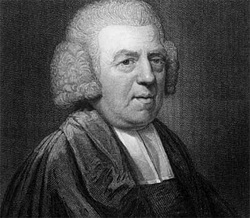John Newton

John Newton (1725-1807) served for decades as a sailor for the British Navy and on British slaving ships. A terrifying storm led to his conversion to Christ. Back in England his studies in the Bible and Biblical languages eventually led to his appointment as an Anglican priest. He became well known as a preacher, a pastor, and a composer of hymns, including "Amazing Grace." Eventually Newton became a leader in the movement to abolish slavery, speaking forcefully from his experience.
His regret over his role in the slave trade no doubt figures in his poem on the prodigal son found below.
His regret over his role in the slave trade no doubt figures in his poem on the prodigal son found below.
The Prodigal Son
Afflictions, though they seem severe;
In mercy oft are sent;
They stopped the prodigal's career,
And forced him to repent.
Although he no relentings felt
Till he had spent his store;
His stubborn heart began to melt
When famine pinched him sore.
What have I gained by sin, he said,
But hunger, shame, and fear;
My father's house abounds with bread,
While I am starving here.
I'll go, and tell him all I've done,
And fall before his face
Unworthy to be called his son,
I'll seek a servant's place.
His father saw him coming back,
He saw, and ran, and smiled;
And threw his arms around the neck
Of his rebellious child.
Father, I've sinned - but O forgive!
I've heard enough, he said,
Rejoice my house, my son's alive,
For whom I mourned as dead.
Now let the fatted calf be slain,
And spread the news around;
My son was dead, but lives again,
Was lost, but now is found.
'Tis thus the Lord his love reveals,
To call poor sinners home;
More than a father's love he feels,
And welcomes all that come.
Afflictions, though they seem severe;
In mercy oft are sent;
They stopped the prodigal's career,
And forced him to repent.
Although he no relentings felt
Till he had spent his store;
His stubborn heart began to melt
When famine pinched him sore.
What have I gained by sin, he said,
But hunger, shame, and fear;
My father's house abounds with bread,
While I am starving here.
I'll go, and tell him all I've done,
And fall before his face
Unworthy to be called his son,
I'll seek a servant's place.
His father saw him coming back,
He saw, and ran, and smiled;
And threw his arms around the neck
Of his rebellious child.
Father, I've sinned - but O forgive!
I've heard enough, he said,
Rejoice my house, my son's alive,
For whom I mourned as dead.
Now let the fatted calf be slain,
And spread the news around;
My son was dead, but lives again,
Was lost, but now is found.
'Tis thus the Lord his love reveals,
To call poor sinners home;
More than a father's love he feels,
And welcomes all that come.
